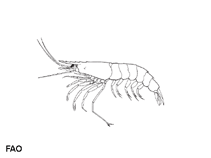Atypopenaeus formosus Dall, 1957
Orange shrimp| Native range | All suitable habitat | Point map | Year 2050 |

|
| This map was computer-generated and has not yet been reviewed. |
| Atypopenaeus formosus AquaMaps Data sources: GBIF OBIS |
Classification / Names ชื่อสามัญ | ชื่อพ้อง | CoL | ITIS | WoRMS
Malacostraca | Decapoda | Penaeidae
Environment: milieu / climate zone / ระดับความลึก / distribution range นิเวศวิทยา
; ระดับความลึก 2 - 15 m (อ้างอิง 133088). Tropical; 1°S - 33°S, 129°E - 154°E
Distribution ประเทศต่างๆ | พื้นที่จำแนกตาม FAO | ระบบนิเวศหลายระบบ | การปรากฏขึ้น,การเกิดขึ้น,พบ | การแนะนำ
Indo-West Pacific: Indonesia, Papua New Guinea, and Australia.
Length at first maturity / ขนาด / Weight / Age
วัยเจริญพันธุ์: Lm ? range ? - ? cm Max length : 7.5 cm TL เพศผู้/กระเทย; (อ้างอิง 8); 9.1 cm TL (female)
Life cycle and mating behavior วัยเจริญพันธุ์ | การสืบพันธุ์ | การวางไข่ | Eggs | ความดกของไข่ | Larvae
Main reference
อ้างอิง | ผู้ประสานงาน | ผู้ร่วมมือ
Holthuis, L.B. 1980 FAO Species Catalogue. Vol. 1. Shrimps and prawns of the world. An annotated catalogue of species of interest to fisheries. FAO Fish. Synop. 125(1):271 p. Rome: FAO. (อ้างอิง 8)
IUCN Red List Status
(อ้างอิง 130435: Version 2025-1)
CITES status (อ้างอิง 108899)
CMS (อ้างอิง 116361)
Threat to humans
Human uses
การประมง: มีการค้าเพียงเล็กน้อย
| FishSource |
เครื่องมือ
ข้อมูลเพิ่มเติม
Max. ages / sizes
Length-weight rel.
Length-length rel.
Length-frequencies
Mass conversion
อุดมสมบรูณ์
แหล่งที่มาจากอินเตอร์เน็ต
BHL | BOLD Systems | CISTI | DiscoverLife | FAO(Publication : search) | Fishipedia | GenBank (genome, nucleotide) | GloBI | Gomexsi | Google Books | Google Scholar | Google | PubMed | แผนภูมิชีวิตแบบต้นไม้ | Wikipedia (Go, ค้นหา) | บันทึกทางด้านสัตววิทยา



